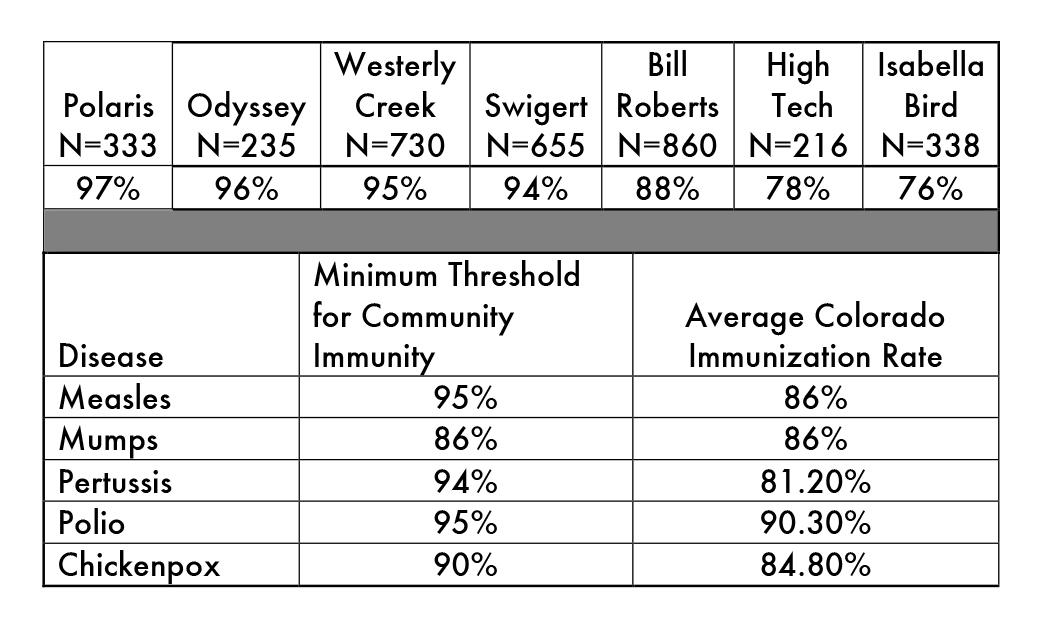Vaccine rates at Stapleton elementary schools range from 76% to 97%. The community is protected when 86% – 95% of the population is vaccinated (levels vary with different diseases). That means some Stapleton schools don’t meet these guidelines for protection of the community.
When enough people in a community are vaccinated, that creates a protective effect against the disease (called community immunity). But vaccines are not 100% effective, so under certain exposure conditions, a vaccinated child can still get the disease. Even more at risk are babies, individuals with weakened immune systems, children with certain allergies, the elderly, and pregnant women who rely on other members of their communities to get vaccinated and help protect them from what could be life threatening illnesses.
Transparency around school and licensed child care immunization rates is important for all parents and every community, especially for the parents of a child who is immune-compromised, too young to be vaccinated, or medically fragile. It is mandatory for any school (or licensed child care facility) in Colorado to disclose their immunization and vaccine exemption rates on request as of July 1st 2014 (House Bill 14-1288). Anyone can call and ask for the facility wide rates. This author exercised this right and called seven area schools to obtain vaccine compliance rates.

For each vaccine preventable disease, the rate of vaccine compliance in order to achieve community immunity depends on several factors. High vaccine effectiveness, short duration of vaccine effectiveness, short duration a person is contagious, long duration of immunity after infection, low infectiousness of the organism, and a low number of susceptible people in the population that the affected patients are in contact with all result in a lower rate of compliance needed for community immunity. These factors are used to determine the number of unprotected people in a population that one infected person would be expected to infect (the basic reproduction number = R0), a higher R0 requires a higher population compliance rate.
A Parent Forum on Immunization Exemptions is being held this week by The Colorado Department of Public Health and Environment (CDPHE):
Parent Forum on Immunizations
January 29, 2015 5:00 p.m. – 7:00 p.m.
CDPHE Building A, 1st Floor, Sabin/Cleere Room
4300 Cherry Creek Dr. S, Denver, CO 80246
A link to register for this event is below
Registration link for CDPHE forum: https://docs.google.com/forms/d/1X8YrUNOEhjgJpybwpo5jyckDY2SzuKicwhArfdfSXKM/viewform?c=0&w=1
Information about immunizations in Colorado is available: www.colorado.gov/pacific/cdphe/school-immunizations
Amanda Allshouse is a 6 year member of the Stapleton United Neighbors Registered Neighborhood Organization, and a Senior Research Instructor in the Colorado School of Public Health department of Biostatistics and Informatics.



It seems that DPS factors in the age-based schedule for vaccinations in its definition of compliance, as ECE-grade rates for one school were 91%.
The schools that are still filling seats have a much higher percentage of ECE children than the other schools (or compared to the percentage that they will have when all seats are full). Does this artificially lower the percentage of vaccinated children because ECE children have not completed their vaccination schedule? (The mmr booster is not required until Kindergarten, for example).